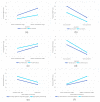Attitudes towards Participation in a Passive Data Collection Experiment
- PMID: 34577291
- PMCID: PMC8473380
- DOI: 10.3390/s21186085
Attitudes towards Participation in a Passive Data Collection Experiment
Abstract
In this paper, we present the results of an exploratory study conducted in Hungary using a factorial design-based online survey to explore the willingness to participate in a future research project based on active and passive data collection via smartphones. Recently, the improvement of smart devices has enabled the collection of behavioural data on a previously unimaginable scale. However, the willingness to share this data is a key issue for the social sciences and often proves to be the biggest obstacle to conducting research. In this paper we use vignettes to test different (hypothetical) study settings that involve sensor data collection but differ in the organizer of the research, the purpose of the study and the type of collected data, the duration of data sharing, the number of incentives and the ability to suspend and review the collection of data. Besides the demographic profile of respondents, we also include behavioural and attitudinal variables to the models. Our results show that the content and context of the data collection significantly changes people's willingness to participate, however their basic demographic characteristics (apart from age) and general level of trust seem to have no significant effect. This study is a first step in a larger project that involves the development of a complex smartphone-based research tool for hybrid (active and passive) data collection. The results presented in this paper help improve our experimental design to encourage participation by minimizing data sharing concerns and maximizing user participation and motivation.
Keywords: data fusion; informed consent; surveys.
Conflict of interest statement
The authors declare no conflict of interest.
Figures


References
-
- De Bruijne M., Wijnant A. Comparing Survey Results Obtained via Mobile Devices and Computers: An Experiment with a Mobile Web Survey on a Heterogeneous Group of Mobile Devices Versus a Computer-Assisted Web Survey. Soc. Sci. Comput. Rev. 2013;31:482–504. doi: 10.1177/0894439313483976. - DOI
-
- De Bruijne M., Wijnant A. Mobile Response in Web Panels. Soc. Sci. Comput. Rev. 2014;32:728–742. doi: 10.1177/0894439314525918. - DOI
-
- Couper M.P., Antoun C., Mavletova A. Total Survey Error in Practice. John Wiley & Sons, Ltd.; Hoboken, NJ, USA: 2017. Mobile Web Surveys; pp. 133–154.
-
- Couper M.P. New Developments in Survey Data Collection. Annu. Rev. Sociol. 2017;43:121–145. doi: 10.1146/annurev-soc-060116-053613. - DOI
MeSH terms
Grants and funding
LinkOut - more resources
Full Text Sources

